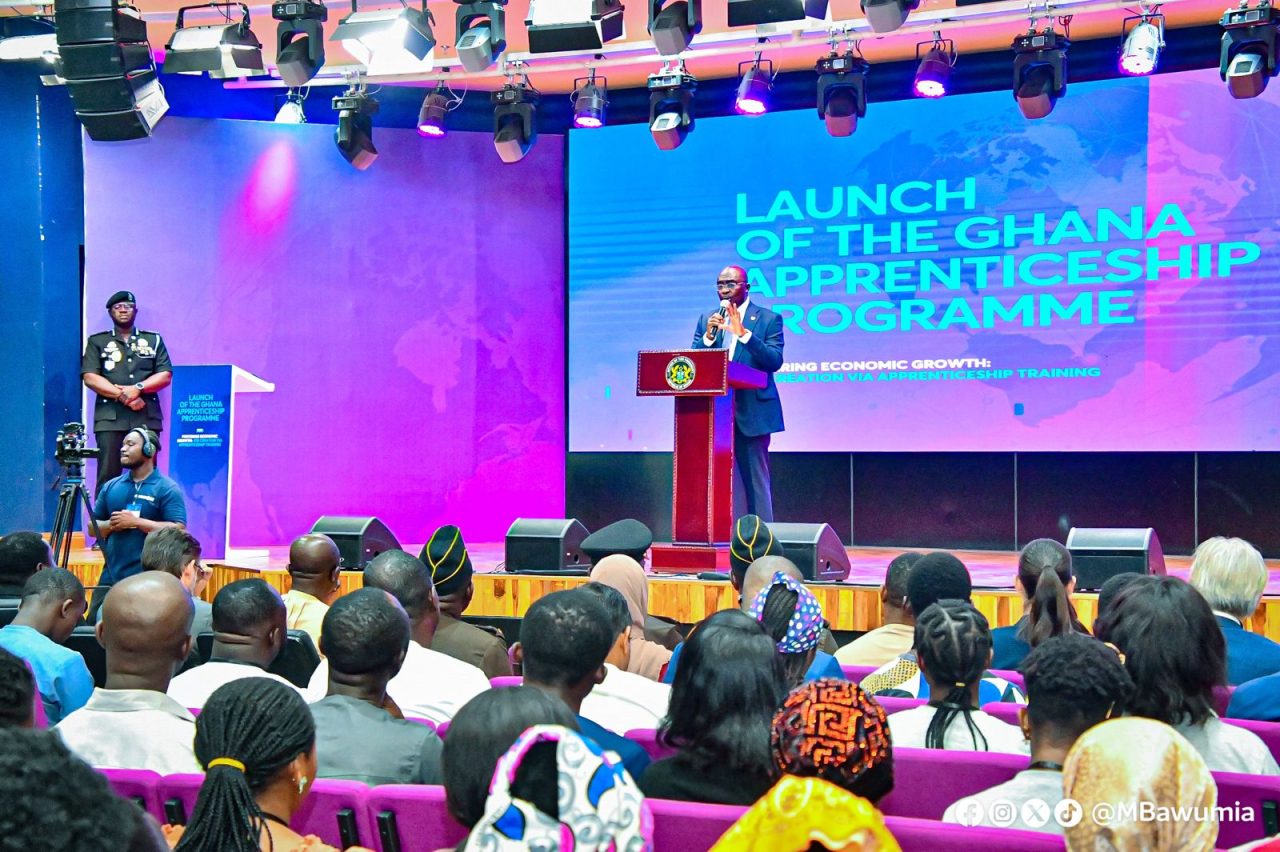
Accra, Ghana//-Ghana Apprenticeship Programme (GAP) has been launched to support Competency-Based Training (CBT) apprenticeship for a total of 50,000 individuals with employable skills throughout the implementation period.
The primary goal of GAP is to be the over-arching programme that provides apprenticeship training tailored to the demands of contemporary jobs, fostering a bridge between traditional apprenticeship systems and modern employment requirements.
The programme is also geared towards reducing unemployment in the country.
Launching the multimillion-dollar programme on Wednesday 13, March 2024, Vice President Dr Mahamudu Bawumia said: “The programme will facilitate a shift from conventional methods to a competency-based approach, ensuring that apprentices are equipped not only with theoretical knowledge but also with practical, industry-relevant skills.
By modernizing the apprenticeship system, GAP strives to make it more adaptable to the evolving needs of industries, enhancing the employability of apprentices and contributing to the overall competitiveness of the Ghanaian workforce”.
He continued: “The programme’s key activities encompass the development of eligibility criteria, training of Master Craft Persons (MCPs) and apprentices, assessment and certification of learners, linkage to job and trade,” he explained.
Additionally, the GAP has established voucher values which will continually be reviewed and adapted to the current economic needs of the private sector and training institutions, thereby bolstering the apprenticeship landscape in Ghana, according to Dr Bawumia.
He stated: “With the Ministry of Education through the Commission for Technical and Vocational Education and Training (CTVET) as the main implementing agency, the programme will be supported with a budget of Ghs800m, made up of US$40 million from the World Bank as well as 20 million Euros from the German Development Bank (KfW).
The programme is also aligned with our development objective of advancing skills development and fostering job creation in Ghana”.
“One distinct feature about this Ghana Apprenticeship Programme (GAP) is that the expected beneficiaries will include, unemployed/underemployed individuals seeking skills and jobs; high school graduates; university graduates and persons who have completed their national service, but want to be reskilled; master craft person, their apprentices and workers; cooperatives and trade associations, private enterprises and workforces; and private and public training providers”, Dr Bawumia explained.
Free TVET
Ghana’s industrial and economic growth depends heavily on modernizing Technical Vocational Education and Training (TVET) to make it responsive to the needs of industry and overall national development.
Dr Bawumia who also delivered the keynote address at the official launch of the Ghana Apprenticeship Programme (GAP), said there is no better time than now for the country’s economy to bounce back from the shocks it suffered because of the COVID-19 pandemic and the global decline in economic activities, and a focus on TVET would accelerate the process.
“You will recall that during my Selfless Leadership and Bold Solutions for The Future speech at the UPSA a few weeks ago, I mentioned Preparing a Workshop of the Future through enhanced focus on Technical and Vocational Education and Training (TVET) as we build on our investment in the Sector.
In line with this, the current administration has since 2017, worked on and continues to implement a clear plan to industrialize Ghana, with one of the key pillars of the agenda being to revamp and modernize TVET to create more opportunities for economic empowerment and job creation, hence the Ghana Apprenticeship Programme.
“TVET in Ghana is delivered in either the formal or informal sectors. Formal or institutional-based TVET is delivered by both private and public TVET providers.
Furthermore, a huge population of young people acquire employable skills in the informal economy through apprenticeships and other forms of informal sector skills training” Dr Bawumia stressed.
“Indeed, long before the colonialists even set foot on our coasts, somewhere in the 14th century, the major mode of training which existed in Ghana was the apprenticeship system of training”.
157,000 students enrolled
Dr Bawumia also revealed that to date, over 157,000 students had enrolled in the Government’s TVET institutions, well over the 20,000 who had enrolled before 2017.
“The total number of enrolments in Government TVET institutions stands at well over 157,681. The breakdown is as follows: 2021/2022 academic year had 47,000 new form one students enrolling; 2022/2023 had 50,200 new form one students enrolling and now, for the 2023/2024 academic year, we have 60,481 students enrolling on the free TVET programme”, he emphasised.
World Bank Country Director
In his remarks, the World Bank Country Director for Ghana, Robert R. Taliercio said: “The World Bank strongly aligns with the objectives of skills development for industrialization and economic transformation, which this event is about”.

From a small population of 6.7 million in 1960 to around 32 million in 2023, Ghana’s ethnically diversified population has increased rapidly at an average rate of 2.3 per cent.
Currently, 75 per cent of the population is under 35 years old and the youth population is expected to reach 45 million by 2040, he noted.
How is the World Bank supporting
Mr Taliercio told the well-attended gathering that the Ghana Jobs and Skills Project, one of the government’s flagship projects funded under IDA, is supporting skills development and job creation, and is contributing to Ghana’s Industrialization and Economic Transformation agenda.
He explained that the project provides great news to the Ghanaian youth seeking to learn an industrial technical trade, and trades in services with the launch of the National Apprenticeship Programme in collaboration with the Commission for Technical and Vocational Training (CTVET).
“The CTVET offers a diversified range of Competency-Based Trades (over 100 different trades) to about 20,000 young people in the next 2.5 years under the Jobs and Skills Project”.
“Out of the four components, the Ghana Commission for Technical and Vocational Training (CTVET) is projecting to provide 20,000 young men and women with apprenticeship training in critical transformative sectors to support Ghana’s economic transformation agenda as well as address youth employment”.
Investing in youth through jobs and skills contributes to human capital development, the greatest asset a country can have in this fast-changing era, Mr Taliercio indicated.
He added that investing in youth also lays a particularly strong foundation for both prosperity and resilience, as well as national growth and competitiveness.
“The World Bank is supporting government to fundamentally change the approach to investing in youth, by supporting a whole-of-government approach to high-impact investments across many sectors”, Mr Taliercio assured.
Germany assures Ghana

On his part, the German Ambassador to Ghana, Daniel Krull also assured the Ghanaian government that his government back home would continue to support the GAP and other TVET programmes to help reduce unemployment and poverty in Ghana.
The Director-General of CTVET, Dr Fred Kyei Asamoah was confident that with the launch of the Ghana Apprenticeship Programme, the country’s TVET is on the trajectory of growth.


